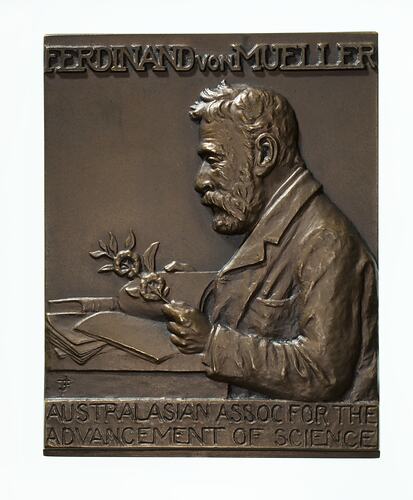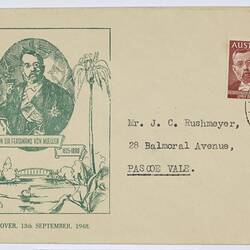Baron Ferdinand von Mueller was was arguably Australia's most prominent 19th century scientist. He was born in Rostock on 30 June 1825. At the age of 15 he began to pursue a life-long passion for botany by extensively researching the vegetation of the Schleswig-Holstein area, a project that would take seven years. After his parents both died he was apprenticed to a chemist in Husum, graduating in 1846. Shortly afterwards his impressive herbarium was noticed by Professor Nolte of the University of Keil, and the University later awarded him a PhD for his work on Capsella Bursa-pastoris.
Mueller suffered from ill health, and his doctor persuaded him to seek a warmer climate. At the age of 22 Mueller and his two sisters sailed to Adelaide, arriving on 15 December 1847. Here he found work as an assistant chemist, and used his spare time to investigate the local vegetation. He contributed papers to the Linnean Society, London, the German Linnea and local newspapers. He tried farming, but found that it interfered with his botanical interests.
In 1852 Mueller went to Melbourne, where he was appointed government botanist in 1853. He began intensive work on the local flora, and began a series of expeditions to other parts of Victoria, including Mount Buffalo and Wilson's Promontory. He found that many species had potential for industrial and medical applications, such as acacia for its wood, tannin and gum.
In 1854 he was appointed a commissioner for the Melbourne Exhibition. He was also active in the amalgamation of the Victorian Institute for the Advancement of Science into the Philosophical Society. The following year he was appointed botanist to the North West Australia Expedition, which left Sydney in July 1855. The Expedition travelled nearly 5,000 miles in 16 months. Mueller observed some 2,000 species, of which about 800 were new to Australian botany. On his return to Melbourne, Mueller was appointed director of the Botanical Gardens, while on leave from his position as government botanist. He immediately arranged for the construction of a herbarium and contributed his own extensive collection. He contributed significantly to the seven volumes of Flora Australiensis, the first comprehensive work on Australian flora, but never recovered from the disappointment of being unable to complete the work himself.
Mueller was one of the first people to take a scientific interest in Victorian forests, and argued against indiscriminate clearing of land. He encouraged the commercial distillation of eucalyptus oil and exported eucalyptus seeds to countries including India, Algeria and California, arguing they combatted malaria. By 1868, at the age of 43, his directorship of the gardens was under criticism, in part because he was not installing sufficient works of art and 'plantations'. He was replaced in 1873. He continued to prolifically publish papers and articles, and surveyed the forests and coastline of Western Australia by request of the Western Australian Government. He contributed to discussions on acclimatisation, and continued to introduce fauna and flora to Australia. He founded the Royal Society of Victoria and was president of the Geographical Society (Victorian Branch). He won many European honours including the medal of the Royal Society, London, and in 1861 was appointed a heredity baron by the King of Wurttemberg. His German and European scientific contacts were of enormous value to Australian science.
Mueller never married - he was dedicated to his work and had little social life. He died on 10 October 1896 in South Yarra, at the age of 71, and was survived by one sister.
References:
Australian Dictionary of Biography.
More Information
-
Keywords
-
Localities
-
Authors
-
Article types

